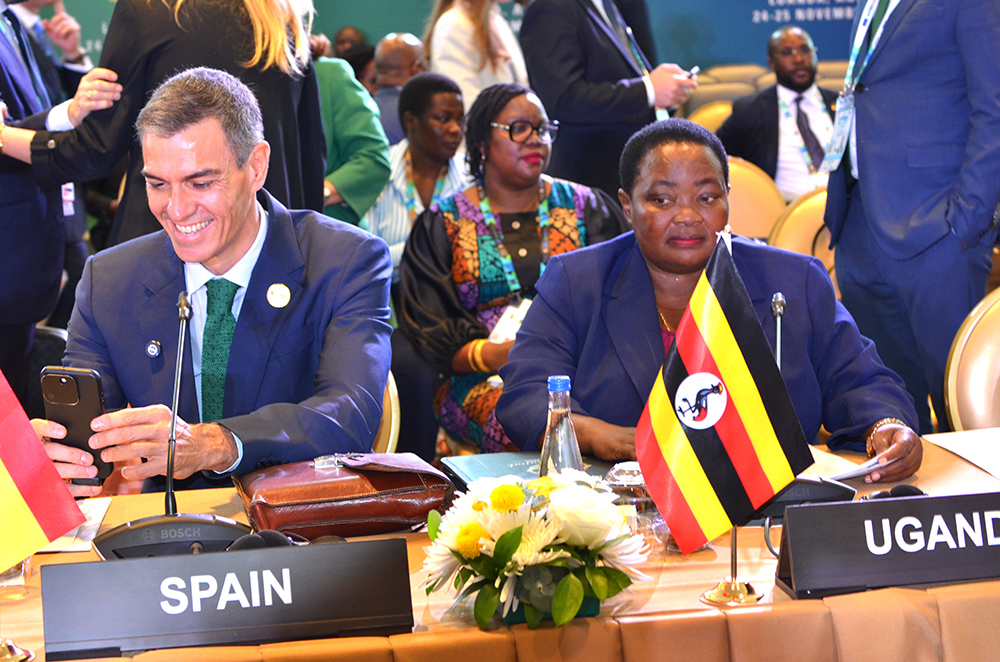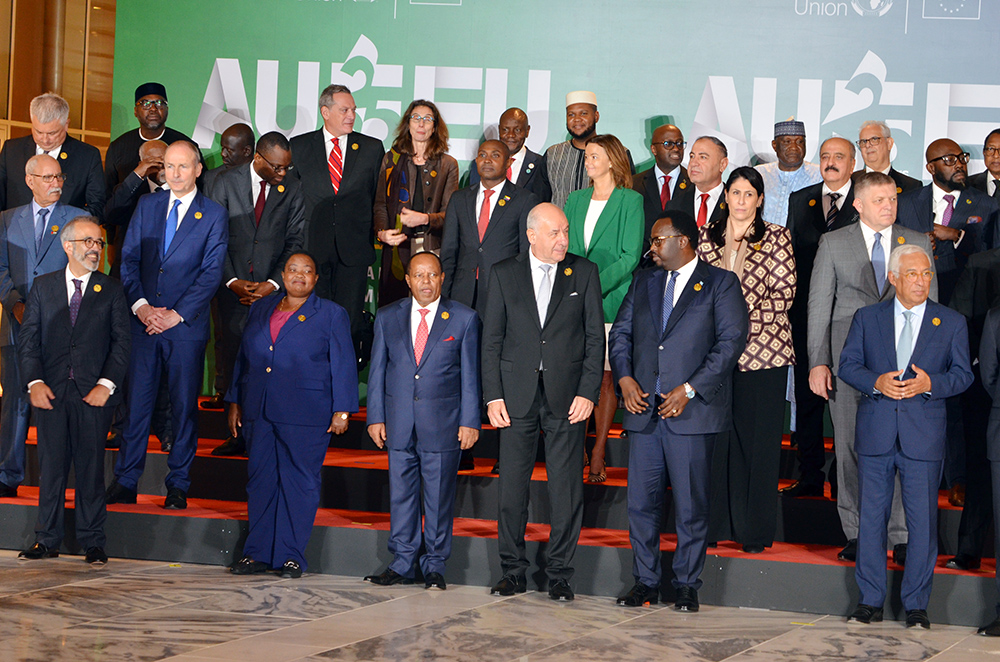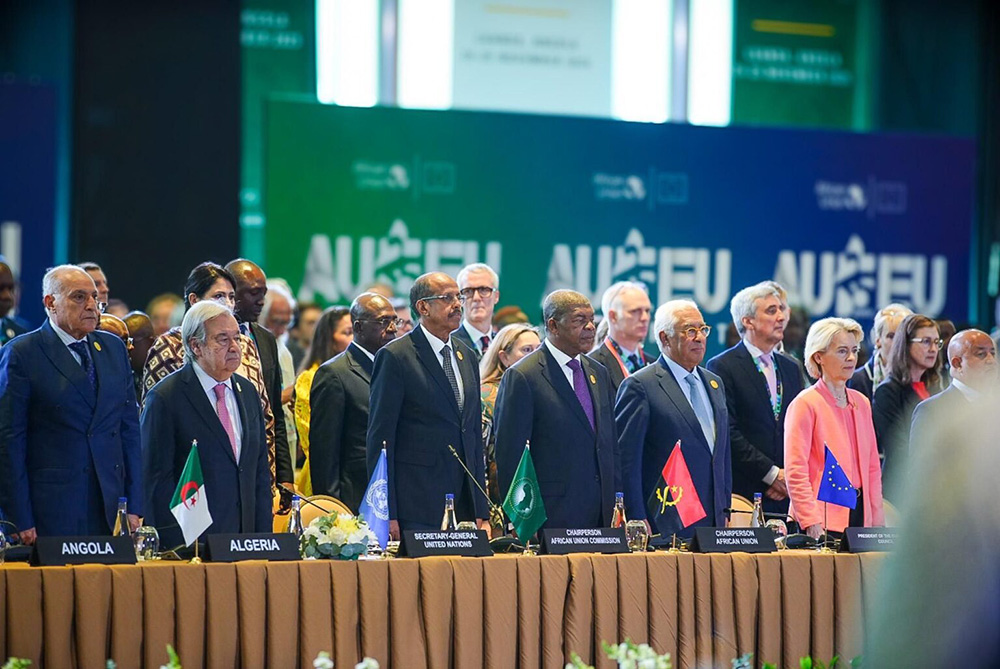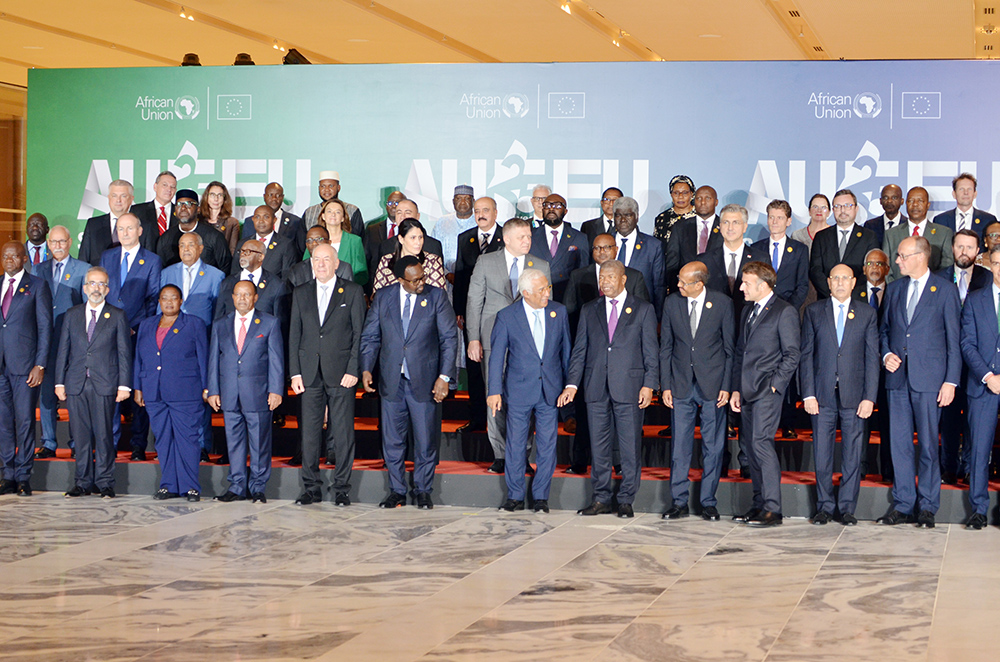Museveni calls for more investment in peace and security to fight extremist groups
Museveni noted that the African Union Support and Stabilisation Mission in Somalia (AUSSOM) faces serious funding challenges. The Mission requires US$15 million per month to function effectively.
Prime Minister Robinah Nabbanja presenting Uganda's statement at the AU-EU summit in Luanda, Angola. (Courtesy photo)
________________ The Prime minister of Uganda Robinah Nabbanja at the AU-EU Summit in Lunda, Angola. (Courtesy photo)
President Yoweri Museveni has asked the African Union and European Union to prioritise the funding of the fight against extremist groups such as Al-Shabaab in Somalia.
Museveni noted that the African Union Support and Stabilisation Mission in Somalia (AUSSOM) faces serious funding challenges. The Mission requires US$15 million per month to function effectively.
Uganda was the first country to contribute troops to the Somalia peace efforts under the African Union Mission in Somalia (AMISOM), with over 6,000 troops in 2007, and maintains thousands more under AUSSOM.
“You will recall that the African Union Transition Mission in Somalia was closed with US$96 million in outstanding arrears. The African Union has repeatedly called for the full implementation of UN Security Council Resolution 2719 to ensure predictable and sustainable financing," Museveni stated on Tuesday in his address to the 7th African Union-European Union summit in Luanda, Angola.
The 7th AU–EU Summit held from 24–25 November 2025 in Luanda, Republic of Angola, brought together Heads of State and Government from African Union Member States and European Union Member States to reaffirm their long-standing partnership and chart a renewed path of cooperation.
In a speech delivered by the Prime Minister Robinah Nabbanja, he (Museveni) added that, "It is worth noting that the budget for the UN Support Office in Somalia is expected to face a 25% cut. If this Mission fails, the investments so far made by the European Union and partners will go to waste, and the gains made against Al-Shabaab could be reversed. This has severe negative consequences for maritime security and international trade.” Museveni observed
A release from the Prime Minister's Press Units states that the President said Uganda fully supports multilateralism and called for further investment in peace and security across Africa as this benefits both the continent and the wider international community.
“Before the African Union intervention in Somalia, the cost of piracy associated with Al-Shabaab was US$ 7 billion. Supporting the African Union intervention in Somalia is, therefore, justified because it yields a high return on investment.
The President also saluted all the partners who participated, or made pledges during the High-Level AUSSOM financing event held on 25th September 2025 in New York, and the European Union’s commitment to supporting the Mission.
A section of Presidents and heads of state and government pose for a group photo in Luanda, Angola after day one of the summit. (Courtesy photo)
"Your Excellencies, Ladies and Gentlemen, the African Union has contributed US$20 million to the African Union Support and Stabilisation Mission in Somalia under the Crisis Reserve Facility for 2025. This contribution, however, does not free the UN Security Council from its primary responsibility for maintaining international peace and security,” Museveni noted.
He added that, “Uganda reiterates its support for multilateralism. Investing in peace and security in Africa benefits both the continent and the wider international community. Through such investments, we can build stable societies capable of engaging in mutually beneficial trade and investment, as well as create necessary conditions to reduce irregular migration. Investment in peace benefits all of us,” the statement read in part.
The chairperson of the African Union Commission, Muhammad Ali Yosouf, called for more mutual benefit between Africa and Europe.
The president of the European Union Commission, Ursula Von Der Leyen, says that Africa and Europe should be partners by choice and for mutual benefit.
At the sidelines of the summit, the Prime Minister Nabbanja held an engagement with her counterpart of the Netherlands, Mr D. Schoof. During the discussion, the Premier requested the Dutch to step in and fill the gap left by the US pulling out from supporting the refugee programs in Uganda.
Inviting her counterpart for a visit to Uganda, Nabbanja noted that Uganda needs partners to help with supporting her host these very big numbers of refugees.

Dignataries attending the AU-EU summit in Luanda, Angola. (Courtesy photo)
On his part, the Dutch Prime Minister Schoof expressed appreciation to the government of Uganda's commitment to hosting refugees and showing a good model of refugee hosting in Africa.
The 7th AU–EU Summit held from 24–25 November 2025 in Luanda, Republic of Angola, brought together Heads of State and Government from African Union Member States and European Union Member States to reaffirm their long-standing partnership and chart a renewed path of cooperation.
The Summit is co-chaired by H.E. João Lourenço, President of the Republic of Angola and Chairperson of the African Union, and H.E. António Costa, President of the European Council. Mahmoud Ali Youssouf and Ursula von der Leyen, President of the European Commission, attended.
Taking place at a time of profound global uncertainties and shifting geopolitical dynamics, the Summit offers an opportunity for both continents to reaffirm their shared commitment to multilateralism, solidarity, and joint action to address common challenges.
It marks the 25th Anniversary of the AU–EU Partnership and coincides with Angola’s Presidency of the African Union, underscoring Africa’s growing leadership in defining global objectives.

Presidents and heads of state and government pose for a group photo in Luanda, Angola after day one of the summit. (Courtesy photo)
About AUSSOM
The Mission is a multidimensional mission led by the African Union, approved by the UN, and effective as of January 1, 2025. With both military and police components, the mission's goal is to help stabilise Somalia and transition security responsibilities to the Somali National Army.
Uganda was allocated a total of 4,500 military troops as its contingent number for AUSSOM military component. Uganda also contributes police personnel to the mission's police component.
The total AUSSOM mission is authorised to have up to 12,626 troops until June 2025, and a total of 11,900 personnel (including military, police, and civilian staff) from July 1, 2025, to December 31, 2025, as part of a phased drawdown toward an eventual exit in December 2029.